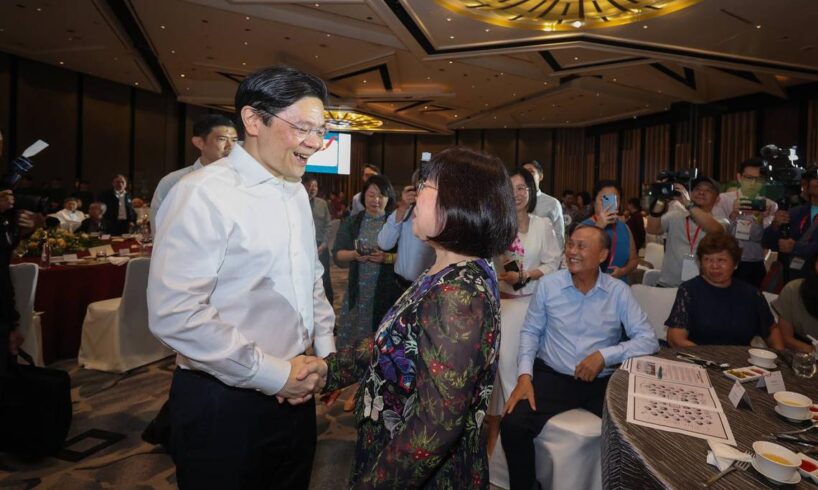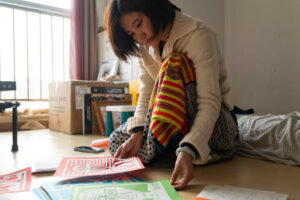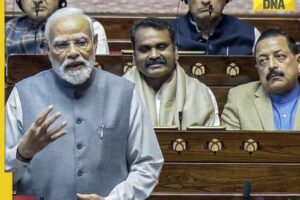
SINGAPORE – Chinese teachers play an important role in Singapore, said Prime Minister Lawrence Wong, as the language is not just a communication tool but also a means of passing on values and culture.
These values include respecting elders, helping others, and not giving up in the face of difficulties, PM Wong said in Mandarin on Sept 6 at the 28th Distinguished Chinese Language Teachers Awards Ceremony at Fairmont Singapore.
The event, organised by Chinese language daily Lianhe Zaobao and ZBSchools – which produces Chinese student publications – was held in conjunction with the Teachers’ Appreciation Gala organised by SPH Media’s Chinese Media Group in celebration of Singapore’s 60th birthday.
Referencing
the recent National Day Parade
where Singapore Armed Forces and Home Team veterans were honoured, PM Wong said that like them, Chinese teachers have played an important role in nation-building and deserve gratitude for their dedication and hard work.
He called on the more than 900 attendees at the gala dinner – including about 200 past recipients of the awards, political office-holders and members of the media – to build a society that is “we first” and not “me first”, echoing
his recent National Day Rally speech
.
“Our Chinese community – including Chinese language teachers, media professionals and community leaders – exemplifies the Singaporean spirit,” he said.
“You prioritise the nation, sacrificing self-interest for the greater good. You demonstrate immense resilience and perseverance in the face of adversity. Without your selfless dedication, Singapore would not be where it is today.”
PM Wong noted that Chinese teachers have made sacrifices over the years for the country’s development.
He referenced changes to education and language policy in the late 1970s and 1980s, when most schools became English-medium schools, where English was the language of instruction for content subjects and mother tongues like Chinese were taught as a second language.
The changes meant that teachers in Chinese-medium schools faced a difficult choice, said PM Wong.
They could either learn English to continue teaching subjects other than Chinese, or focus on teaching just the Chinese language.
For those who chose to teach only Chinese, said PM Wong, their morale was affected as they could no longer teach as many subjects as they used to. “Those days were very difficult for Chinese teachers,” he said. “However, they did not give up, and tried their best to overcome the challenges.”
Recalling his own experience of learning Chinese, PM Wong said he spoke English with his parents at home when he was a child, and had few opportunities to speak Mandarin.
“My teacher was very patient in teaching and encouraging me, and was proud of every little progress I made,” he said.
PM Wong said he now has more opportunities to speak Mandarin and, as a result of the good foundation his Chinese teachers laid for him, can confidently share his views in diplomatic settings and speeches.
He thanked his former teachers – some of whom attended the dinner – for their encouragement and guidance.
PM Wong noted that today, many students find Chinese unfamiliar as most of their education and entertainment is in English.
“Some therefore are not interested in Chinese, and some are even afraid to learn it,” he said.
“In this environment, some Chinese language teachers may understandably feel discouraged,” he added.
“I hope that Chinese language teachers can persevere and face these challenges head-on, because your work is very meaningful. Learning a language takes time. Your efforts will surely bear fruit.”
He said Chinese teachers’ achievements can be realised in various ways, such as students speaking with one another in Mandarin, a student taking to reading Chinese books and newspapers, or former students returning to thank their teachers because they have come to understand the value of learning Chinese.
Commending the seven recipients of the distinguished teacher award, PM Wong highlighted the efforts of two of them – primary school teachers Ding Caihong and Lau Sze Hui – who used technology and artificial intelligence to help their students learn Chinese.
Noting that Sept 6 is the 102nd anniversary of Lianhe Zaobao’s founding, PM Wong said it was apt for the publication to recognise Chinese teachers, whose efforts have helped develop a pipeline of talent for the newsroom, and by extension served the paper’s readers.
Lianhe Zaobao was a result of the merger of Nanyang Siang Pau and Sin Chew Jit Poh, and traces its founding to Sept 6, 1923, when Nanyang Siang Pau was established.
Ms Lee Huay Leng, editor-in-chief of SPH Media’s Chinese Media Group, said in a separate speech that local Chinese media and Chinese education in Singapore share a symbiotic relationship.
“Faced with the concerns of declining proficiency in Chinese and a thinning cultural foundation, the market share of Chinese media is shrinking, and those of us in journalism feel increasingly challenged,” she said in Mandarin.
“Yet, whenever we think of the teachers who never gave up on us, their resilience, and the cultural influence they imparted, we find strength,” Ms Lee added.
Closing his speech, PM Wong said the Government will continue to support the Chinese community, so that it has sufficient resources to promote Chinese culture and cultivate generations of bilingual and bicultural talents for Singapore.
At the event, he met his former physics teacher from Tanjong Katong Secondary Technical School, Mr Heng Zee Kek, and Chinese language teacher from Victoria Junior College, Madam Chan Yoon Ling.
Mr Heng Zee Kek, who was PM Lawrence Wong’s physics teacher from Tanjong Katong Secondary Technical School, and Madam Chan Yoon Ling, who was PM Wong’s Chinese teacher from Victoria Junior College.
ST PHOTO: JASON QUAH
Mr Heng, 76, who was the form teacher of PM Wong’s Secondary 4 class in 1988, said his former student was a prefect, and recalls him being gentle, respectful and well-mannered.
Mr Heng said he was proud to watch PM Wong grow from the young boy, who was treasurer of the school’s mathematics and computer club, to Singapore’s Finance Minister.
PM Lawrence Wong (front row, right) and Mr Heng (front row, second from right) in a school yearbook.
ST PHOTO: JASON QUAH
Madam Chan, 65, said that while PM Wong was a quiet student, he struck her as a responsible student who set high standards for himself.
She recalled an occasion in 1989 when the then student asked for permission to miss an afternoon class to attend an extracurricular activity.
“It was clear to me that his decision was considered, which stood out then because at an age when many were still unclear about what they wanted, he was thoughtful and clear-minded – a reflection of the kind of student he was.”





